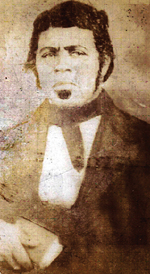 |
| Paul Jennings |
But did you know that the first such memoir was written by a former slave, all the way back in 1865?
It's a little known piece of American History, one they don't teach you in school (but should), even if this book is more of a booklet by today's standards. Paul Jennings, slave to James Madison, was at his side for many years and respected so highly that Daniel Webster purchased his freedom after Madison's death to prevent him from being sold off by Dolly Madison.* (Jennings later worked off this debt to Webster.)
His life alone is pretty amazing, as he assisted with an attempt to rescue slaves via boat, and three of his children served with the Union in the Civil War. Fortunately, there has been a book written about him (by Elizabeth Dowling Taylor, in 2012) which I hope to read someday.
In the meantime, I highly recommend you check out his memoir, which you can read online for free via Google Books. It won't take you long at all to read, but it is definitely insightful. Dictated (I think) to a person named JBR, it has some interesting things to say about President Madison, working to confirm some details of his life and dispel myths at other points.
From the very start, the writing is engaging. He talks about how Secretary Gallatin was a "tip-top man" and noted that the Secretary of War "always agreed with Mr. Madison" which could explain why the disastrous War of 1812 happened. There's great urgency in Jennings' voice as he describes the fear and confusion of the burning of Washington. Particularly telling is that the Madisons were assured "there was no danger" which was of course completely untrue, but typical of the American approach to that war--arrogance bordering on stupidity.
Perhaps my favorite recollection here is the woman who threw Dolly out of her house, because "Your husband has got mine out fighting, and damn you, you shan't stay in my house; so get out!"
It's neat things like that which make this small memoir shine, especially when you learn their source is fellow slaves. Reading this is almost like finding a hidden history.
Jennings is very casual and conversational no matter what the topic. He discusses how the South refused to let the capital move north after the War--and you wonder how that might have changed the face of the Civil War had they succeeded.
Despite his poor treatment at her hands. Jennings is kind to Dolly Madison. While he does burst the "Dolly saved the Washington portrait" story, Jennings also refers to how well-liked she was and feels pit at her poverty at the end of her life. The man even gave he money to help her. That's a level of forgiveness I don't think I could share, were I in his shoes.
This book tells more in about twenty pages than many biographies do in two hundred. It's a great, short read that could probably be finished on your phone while commuting to and from work. Regardless, history fans really shouldn't miss this hidden gem, which is highly recommended.
*In typical "Virginia Founding Fathers Were Terrible People Mode," Dolly promised Jennings his freedom, then went back on it. Funny, that gets left out of the biographies for kids, too.
No comments:
Post a Comment